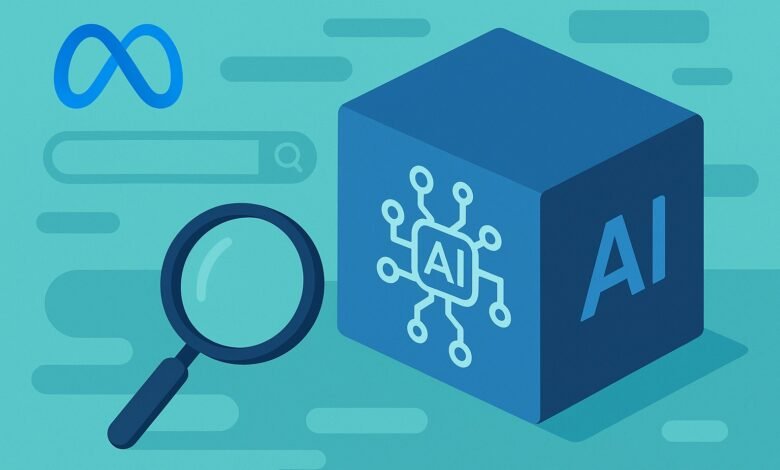Meta Unveils S3: Smarter AI Search

Meta Unveils S3: Smarter AI Search This framework leverages how large language models (LLMs) approach answering complex questions using low supervision and computational resources. S3 stands for Search, Summarize, and Send. With this approach, Meta has redesigned Augmented Retrieval Generation (RAG) training. Traditional systems typically rely on heavily annotated datasets. In contrast, S3 uses task-based feedback to train AI systems on search strategies. This leads to improvements in accuracy and efficiency in standards like HotpotQA and MuSiQue. S3 also supports scalable applications in areas such as healthcare, law, and knowledge management.
Key takeaways
- S3 allows LLMs to improve information retrieval and summation by learning from observations, not from manually labeled data.
- The framework outperforms previous RAG models, including DPR, Atlas, and LangChain, on open-domain question-answering datasets.
- The use of lean supervision reduces training costs and increases adaptability across organizations’ research systems.
- Meta development supports broader applications in automated workflows, business processes, and AI-powered information systems.
Read also: What is the meaning of artificial intelligence? Why is it called “artificial intelligence”?
What is the S3 AI framework?
S3 is Meta’s latest advancement in enhanced recovery generation. Its name refers to a process similar to how people conduct research. The model searches for useful content, summarizes the results, and provides a final answer. In contrast to traditional systems that use millions of manually labeled examples, S3 relies on weak supervision. This technique uses task performance to improve model behavior rather than relying on detailed instructions.
This method allows AI agents to adapt more quickly while using less data. These models become more flexible by learning to recognize effective search patterns based on whether the final output is correct.
Read also: Softmax function and its role in neural networks
Why is weak supervision important in AI training?
Weak supervision allows models to learn from unstructured data. This brings several important benefits:
- Lower cost: It reduces reliance on annotation teams and curated training datasets.
- Greater flexibility: Models can handle a wider range of input types and data sources.
- Scalability: AI systems learn from performing the final task, making it easier to deploy across diverse scenarios.
Weak supervision also supports multiple-hop thinking in answering open-domain questions. Here, the model acts as a detective solving a case. It searches through multiple documents, judges credibility, identifies relevant information, and constructs an answer. S3 learns all this by analyzing the results rather than copying named paths.
Read also: The fastest unloading robot.
S3 versus traditional RAG frameworks: a benchmark comparison
Meta has published results showing that S3 outperforms older RAG models on benchmark datasets. Here’s a comparison between the different frameworks in HotpotQA, MuSiQue, and Natural Questions (NQ):
| range | HotpotQA accuracy | MuSiQue Accuracy | Training cost |
|---|---|---|---|
| S3 (dead) | 79.4% | 81.2% | a little |
| atlas | 75.1% | 76.4% | High |
| Democratic Republic of the Congo + FiD | 71.9% | 73.0% | High |
| langshin raj | 68.7% | 70.1% | moderate |
S3 improves performance by aligning feedback with search behavior. Instead of rating each paper individually, the model looks at the overall quality of the final answer. This enables stronger reasoning across multiple documents and better results that align with user needs.
Production convenience and scalability
The S3 approach is also more computationally efficient. It reduces the need for heavy datasets and uses fewer training cycles. This makes it a solid choice for business environments where compute cost and deployment time are key factors.
Once trained, models using S3 can run faster. They learn to skip useless sources and retrieve only useful data, reducing latency and simplifying performance.
Enterprise and vertical applications
S3 can make a noticeable difference in many industries:
- health care: AI tools can find targeted guidance from medical literature based on individual symptoms or conditions.
- Legal review: Analysis of thousands of documents becomes faster with agents that find and summarize relevant precedents.
- Customer Support: Chat systems can provide more relevant answers by extracting internal help documents more efficiently.
- Institutional knowledge systems: Systems can reduce errors by improving how internal documents are retrieved and summarized during question and answer sessions.
What the experts say
“S3 is a clear step toward smarter LLM systems,” said Dr. Amanda Lee, Senior Researcher at OpenSearch Lab. “The focus on thinking about iteration will help agents grow through tasks rather than remaining stuck in legacy datasets.”
“We’ve tested the S3 in our summation lines,” said Jacob Mendes, a product engineer at a knowledge technology company. “So far, the gains in accuracy and reductions in compute cost are strong indicators that this model is ready for production.”
Read also: Meta invests in artificial intelligence to boost engagement
Frequently asked questions
What is Meta’s S3 Framework in AI?
S3 is an augmented recall generation training method that helps AI learn how to recall and answer based on how well it performs, not just on labeled examples.
How is the S3 different from traditional RAG models?
Older RAG systems relied on named data sets. S3 is based on learning from results, providing better adaptability and lower cost.
Why is weak supervision important in AI?
It reduces data classification needs and expands training resources. Models learn from results rather than fixed, step-by-step instructions.
Can S3 integrate with LangChain or other RAG frameworks?
Yes. S3 can optimize the search and summarization phases in pipelines like LangChain, resulting in improved performance and cost savings.
conclusion
The S3 represents a significant improvement in generating enhanced recall. By learning from task results rather than detailed classification, the Meta framework improves performance and scalability. As more companies deploy this technology, S3 may reshape what is possible with efficient and intelligent AI search systems.
References
Don’t miss more hot News like this! Click here to discover the latest in AI news!
2025-05-29 18:36:00




